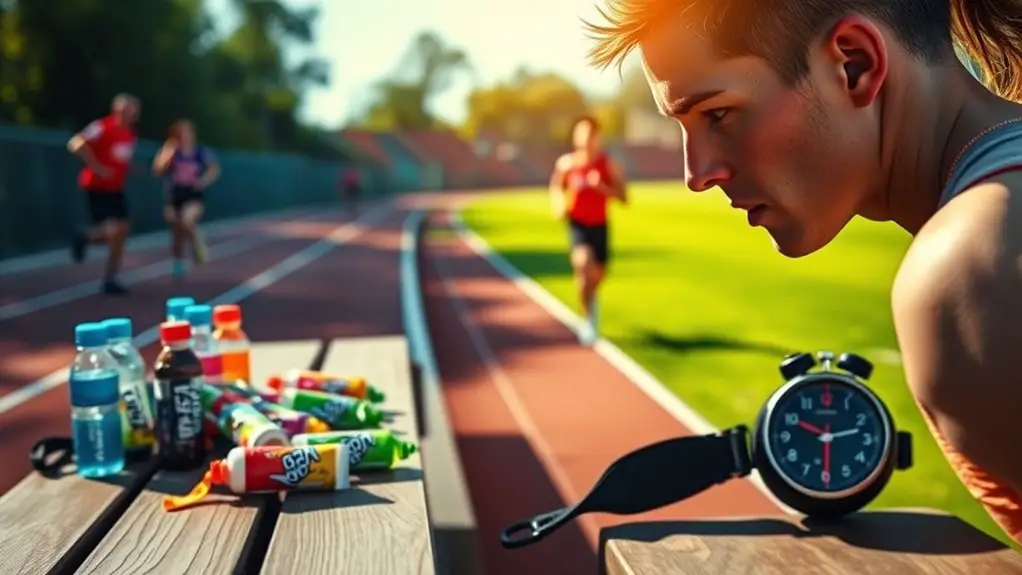To achieve peak performance, you need to time your meals and snacks strategically. Focus on balanced pre-workout nutrition with carbs and protein about 30-60 minutes before exercise. Post-workout, aim for a meal rich in protein and carbs within 30-60 minutes to aid recovery. Hydration's key too! Listen to your body for signals about your nutritional needs. Get ready to explore more about the role of macronutrients and common timing mistakes that could affect your performance.
Understanding Nutritional Timing
When you're aiming for peak performance, understanding nutritional timing can make all the difference. It's not just what you eat, but when you eat that fuels your body and mind. Aligning your meals with your activity can enhance your energy levels and optimize recovery. By consuming the right nutrients at strategic times, you empower yourself to perform better, whether you're hitting the gym or chasing personal goals. Think about timing your meals around your workouts to maximize benefits; this approach can elevate your performance to new heights. Keep in mind that everyone's body is unique, so experimenting with different timings can help you find what works best for you. Embrace this freedom, and let your nutrition propel you toward success!
The Importance of Pre-Workout Nutrition
Before you step into your workout, fueling your body with the right nutrients can set the stage for peak performance. Pre-workout nutrition isn't just about energy; it's about enhancing endurance and strength. A balanced meal rich in carbohydrates and protein, consumed about 30 to 60 minutes before you hit the gym, can elevate your game. Carbs provide the quick energy you need, while protein helps in muscle repair and growth. Don't forget hydration—water's essential for peak performance. Listen to your body, and find what works best for you. By investing in your pre-workout nutrition, you're not just preparing for a session; you're embracing a lifestyle of freedom and empowerment, releasing your potential with every move you make.
Optimal Post-Workout Recovery Meals
To maximize your recovery after an intense workout, focusing on the right post-workout meal is essential. You want to replenish your energy and repair your muscles, so aim for a combination of protein and carbohydrates. A shake with protein powder and a banana is quick and effective, or you could whip up a hearty meal like grilled chicken and quinoa with veggies. Don't forget healthy fats; they'll help keep you satisfied. Timing matters, too—try to eat within 30 to 60 minutes post-workout to kickstart recovery. Listen to your body and choose meals that excite you. Freedom in your choices will make your recovery enjoyable and keep you motivated for your next workout session!
Timing Your Snacks for Maximum Energy
While you might think any snack will do, timing your snacks can considerably boost your energy levels throughout the day. To maintain that sense of freedom and liveliness, try to snack strategically. Aim for small, nutrient-dense snacks about two to three hours after your meals; this keeps your metabolism humming without weighing you down. If you're gearing up for a workout, a quick snack rich in carbs and a bit of protein 30-60 minutes prior can enhance your performance. Post-workout, refuel within 30 minutes with something light to aid recovery. Listen to your body—it knows when you need that extra lift. With the right timing, you can transform your snacking into a powerful ally for your energy and overall well-being.
The Role of Macronutrients in Nutritional Timing
Snacking isn't just about timing; it's also about what you're consuming. Macronutrients—carbohydrates, proteins, and fats—play an essential role in your energy levels and recovery. Carbs are your go-to for quick energy, especially before workouts. They fuel your muscles and keep you moving. On the other hand, proteins help repair and build muscle, making them important post-exercise. Don't forget healthy fats; they provide sustained energy and support overall health when included in your meals. Balancing these macronutrients in your snacks allows you to optimize performance and feel free to enjoy your food without guilt. So, whether you're gearing up for a workout or winding down afterward, make smart choices to fuel your freedom and performance.
Hydration and Its Impact on Performance
Hydration is a cornerstone of peak performance, yet it's often overlooked. You might not realize how much even mild dehydration can dull your focus and slow your reactions. When you're active, your body loses water through sweat, so it's essential to replenish those fluids regularly. Drinking water or a sports drink before, during, and after exercise helps maintain ideal performance.
Staying hydrated can enhance your endurance and strength, letting you push your limits without feeling sluggish. You'll also recover faster, allowing you to get back to what you love sooner. Experiment with your hydration routine to see what works best for you, ensuring you're always ready to seize the moment and perform at your peak.
Listening to Your Body: Individualized Timing
Understanding your body's signals is essential for optimizing nutritional timing. Each person's needs differ, so listen closely to what your body tells you. You might find that some foods fuel your workouts better than others. Here's a simple guide to help you gauge your individual timing preferences:
| Time of Day | Energy Level | Suggested Foods |
|---|---|---|
| Morning | Low | Smoothies, Oatmeal |
| Pre-Workout | Moderate | Banana, Nut Butter |
| Post-Workout | High | Protein Shake, Chicken |
Common Mistakes in Nutritional Timing
While many athletes focus on what to eat, they often overlook the timing of their meals, leading to common mistakes that can undermine performance. One major error is not fueling properly before workouts. Skipping pre-workout nutrition can leave you feeling depleted. Another mistake is failing to replenish immediately after training; the post-workout window is essential for recovery. Some athletes might also consume heavy meals too close to performance, causing discomfort. Additionally, ignoring hydration timing can lead to fatigue and decreased endurance. It's important to find a rhythm that aligns with your body's needs. By being mindful of these timing pitfalls, you can maximize your energy and enhance your overall performance, giving you the freedom to push your limits.
Frequently Asked Questions
Can I Adjust My Meal Timing Based on Workout Intensity?
You can adjust your meal timing based on workout intensity. If you're pushing hard, fueling up beforehand may enhance performance. Listen to your body, and find what suits your rhythm best for ideal results.
How Does Sleep Affect My Nutritional Timing Strategy?
Sleep's essential for recovery and energy. If you're not getting enough, your body's ability to utilize nutrients diminishes. So, adjusting your meal timing around quality sleep can enhance performance and overall well-being.
What Role Do Supplements Play in Nutritional Timing?
Did you know that nearly 70% of athletes use supplements? They can enhance your nutritional timing by filling gaps and optimizing recovery. Just remember, balance is key; don't rely solely on them for peak performance.
Is Intermittent Fasting Compatible With Nutritional Timing for Performance?
Intermittent fasting can align with your performance goals, but it's essential to listen to your body. Finding the right window to fuel up can enhance your energy levels and overall results during training or competition.
How Can I Maintain Nutritional Timing While Traveling?
Traveling can feel like a whirlwind, but you can totally maintain nutritional timing! Pack snacks, research meal options, and set reminders to eat. Your freedom's waiting, and staying fueled keeps you soaring high!




